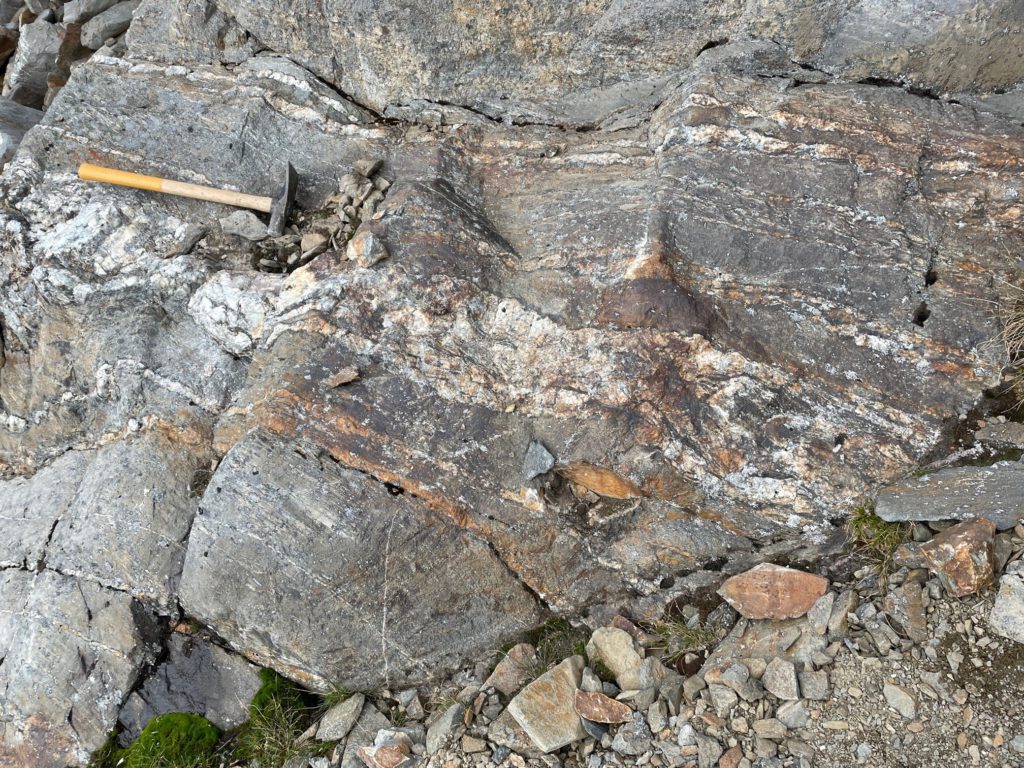JV Article: Lode Gold to spin out Yukon and Atlantic assets


When Wendy Chan joined Stratabound Minerals’ board, she could not understand why the company, with gold projects in California, Yukon and New Brunswick was languishing with a market capitalization of about $3 million.
“What jumped out at me was how undervalued our Canadian assets were compared to other juniors with projects near ours,” says Chan, who spent the first half of her career devising strategic plans and managing P&L’s for Fortune 500 companies, and the second half working in the mining industry. “In November 2020, our market capitalization was $30 million with just the Yukon and New Brunswick assets and today it’s $7 million.”
Chan laid out a strategy for restructuring and growth. The company – renamed Lode Gold Resources (TSXV: LOD; US-OTC: SBMIF) – intends to spin out its Canadian assets into a new company, Gold Orogen.
Underscoring the decision was the discovery of a reduced intrusion-related gold system (RIRGS) on its Win project in the Yukon’s southern Tombstone Belt. Late last year the company found sheeted gold-bearing quartz veins in hornfels-altered outcrop that returned up to 8.53 g/t gold and 155 g/t silver.
The vein array at Win trends onto the Golden Culvert project, about 11 km to the south. Golden Culvert has a 24-km strike and has yielded economic drill intercepts (2.53 g/t gold over 33.1 metres including 60.1 g/t gold over 0.9 metre); significant trench values (up to 95 g/t gold over 1.5 metres); and surface float samples (up to 320 g/t gold within a 3-km by 250-metre-wide gold-in-soil anomaly).
Win and Golden Culvert are at the centre of a 12- by 55-km orogenic RIRGS district in the southern portion of the Tombstone belt, which hosts projects such as Snowline Gold’s (TSXV: SGD; US-OTC: SNWGF) Rogue and Rackla Metals’ (TSXV: RAK) Rak. The RIRGS discoveries in the Yukon have delivered superior returns led by Snowline, which is up 1,314% since it started trading in April 2021, according to Chan.
Lode Gold’s third project, McIntyre Brook, is about 80 km west of Bathurst in the Appalachian Gold Corridor, a 4,000-km long structure stretching from Newfoundland into South Carolina. The APC contains deposits like New Found Gold’s (TSXV: NFG; NYSE-AM: NFGC) Queensway project and OceanaGold’s (TSX: OGC; US-OTC: OCANF) Haile mine.
McIntrye Brook occupies 17 km of strike adjacent to Puma Exploration’s (TSXV: PUMA; US-OTC: PUMXF) Williams Brook high-grade gold project. The company believes McIntyre Brook’s geology is shared with Puma’s Lynx deposit to the west. “McIntyre Brook has had little drilling but both holes hit gold, the best being 20 metres of a gram, and that’s a good start,” says Lode Gold’s vice-president of exploration Buddy Doyle, who joined the company in December.
Doyle, part of teams at Rio Tinto (NYSE: RIO; LSE: RIO; ASX: RIO) who discovered the Minfie gold deposits in Papua New Guinea and the Diavik diamond deposits in the Northwest Territories, notes Lode Gold will kick off the season with soil sampling and magnetic surveys.
“With the addition of Buddy to the team, we now have the right people, assets, place and time – four pillars that will ensure a successful mining company,” Chan says.
In the Yukon, exploration will focus on more soil sampling and magnetotellurics. “Getting 8 grams gold at Win from the little bit of work we’ve done was a good start, and at the Golden Culvert showing we have 20 km of gold-in-soil anomalies and only 20% of it has been explored.”
Doyle also notes that the sheeted veins at Win occur in hornfels on top of the intrusion. “One of the reasons people think Snowline is so high grade is because it’s at the top of the intrusive. It’s early days for us and we’re high up in the intrusive too, but we have to show that.”
At Fremont, the company sees potential for a high-grade orogenic gold deposit. Fremont was previously mined at 8 g/t gold. Three step-out holes hit structures at depth.
The asset is three hours from San Francisco on the Mother Lode Belt, which has produced about 50 million ounces.
The company picked up the asset when it acquired California Gold Mining in August 2021 in an all-share deal valued at $11 million.
“Fremont came with 23 km of underground workings that at today’s costs would have a replacement value of at least US$100 million,” says Gary Nassif, the company’s senior vice-president. “The project has about 1 million indicated oz. and another 2 million oz. of inferred, and that evaluated only 1.4 km of Fremont’s 4-km strike length, or 35%.”
A March 2023 preliminary economic assessment estimated an 11-year mine life and initial capital costs of US$203 million. The study projected an after-tax net present value (at a 5% discount rate) of US$217 million and an internal rate of return of 21% at a gold price of US$1,750 per ounce. At US$2,000 per oz., the NPV and IRR increase to US$370 million and 31%, respectively.
“We picked this up for a song, it was a brilliant move,” says Doyle. “There’s excellent resource expansion potential.”
The preceding Joint Venture Article is PROMOTED CONTENT sponsored by Lode Gold Resources and produced in co-operation with The Northern Miner. Visit: www.lode-gold.com for more information.
Comments